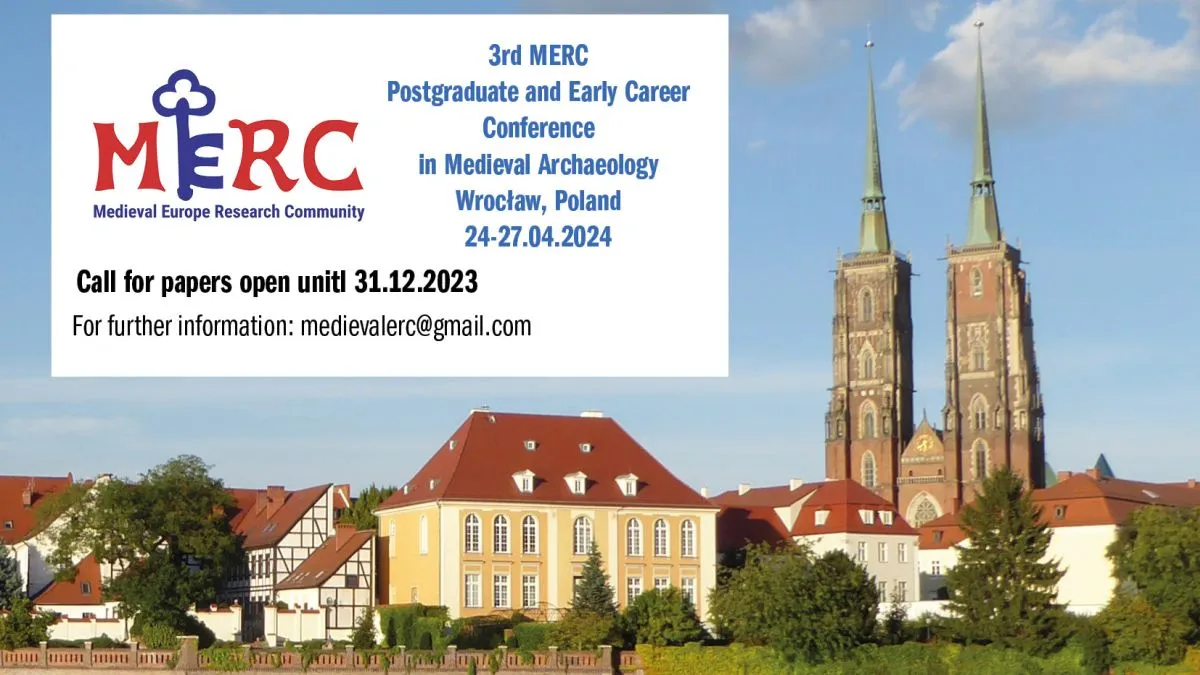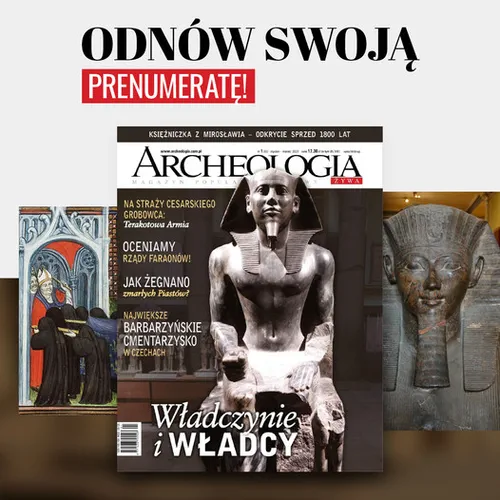
3rd MERC Postgraduate and Early Career Conference in Medieval Archaeology
Z przyjemnością zapraszamy na 3. konferencję MERC dla doktorantów i młodych naukowców z zakresu archeologii średniowiecza! Celem konferencji jest stworzenie i stymulowanie międzynarodowego forum dla doktorantów i młodych naukowców zajmujących się archeologią średniowiecza.
Jest to trzecia konferencja organizowana w tej serii, za każdym razem w innym kraju. Poprzednie edycje, które odbyły się w Puli (Chorwacja, 2019) i Pradze (Czechy, 2022), cieszyły się dużą popularnością, gromadząc co najmniej 40 uczestników z 14 krajów za każdym razem.
Oferujemy możliwości nawiązywania kontaktów w celu dalszej współpracy międzyregionalnej oraz promujemy badania najwyższej jakości. Konferencja MERC to nieoceniona okazja do zapoznania się z aktualnymi tematami, metodami i projektami prowadzonymi na całym świecie. Zapraszamy do zgłaszania referatów na dowolny temat związany z archeologią średniowiecznej Europy.
MERC jest następcą Kongresów Średniowiecznej Europy, które odbywały się w Yorku, Brugii, Bazylei i Paryżu od 1992 do 2007 roku. Przyświecają mu te same cele i idee. Jego celem jest promowanie badań w dziedzinie archeologii średniowiecza (400-1600 n.e.) w każdym kraju w całej Europie, poprzez zapewnienie centrum dla istniejących towarzystw i badaczy. Wspieranie praktyków w Europie i na świecie. Główną ideą jest archeologia średniowiecza bez granic.
Wystąpienia w formie artykułów, tak jak w przypadku ostatniego spotkania, zostaną opublikowane w formie recenzowanej monografii dostępnej w trybie otwartego dostępu.
Aby uzyskać więcej informacji, proszę kontaktować się pod adresem: medievalerc@gmail.com
Miejsce konferencji: Muzeum Archeologiczne we Wrocławiu
Projekt dofinansowany ze środków budżetu państwa, przyznanych przez Ministra Edukacji i Nauki w ramach Programu „Doskonała Nauka II”
Program konferencji
Środa, 24.04.2024
- 13:00 Registration
- 14:00 Opening
- 14:40 Coffee break
- 15:00 Matthias Biro Sarrias (University of Granada), Problematics and first results of the study of the Alcazar de Bayra: understanding the Nasrid border through its architecture
- 15:20 Camilla Felicioni (Independent Researcher), The case of Arena: comparison and similarities of the castles in Vibo Valentia area
- 15:40 Michal Mrva (IA CAS Prague), Development of settlement structure of eastern end of Prague castle. Present state of knowledge and methodological approaches to its expansion
- 16:00 Ghinwa Saba (Pázmány Péter Catholic University), The Evolution of the Defensive Architecture in Medieval Coastal Syria
- 16:20 Discussion
- 16:40 Coffee break
- 17:00 Silvia Berrica (University of Alcalá), Space and Tools: A Preliminary Study of High Medieval Iberian Metallurgical Activity (Sierra de Guadarrama, Madrid, Spain)
- 17:20 Michael Lebsak (Masaryk-University Brno), Yet again Medieval mining?! – A multi-proxy approach to the Political Economy of Iron in the Central European Early Middle Ages (700-1000 AD)
- 17:40 Discussion
- 18:00 Weronika Bałdyga (University of Warsaw), Spatial and temporal distribution of strongholds in the Wierzyca River Basin. Natural and cultural landscape
- 18:20 Vit Kozák (Masaryk University Brno), Medieval Landscapes Through the Weberian lens: Ideal Types and Power Dynamics
- 18:40 Joanne Machin (University of the Highlands and Islands in Scotland), Out of the Blue: Revaluating pilgrimage from a maritime perspective
- 19:00 Discussion
- 20:00 Reception
Czwartek, 25.04.2024
- 10:00 Jack Cranfield (University of Exeter), ‘Muck-grubbing in the pug of the pilrag’: The Application of Fieldwalking in the Reconstruction of a lost Medieval Industrial Landscape in South-East England
- 10:20 Letizia Dalle Vedove and Alessandra Coleschi (University of Siena), The Briatico project: an example of long term rural landscape through the element of the farmhouse
- 10:40 Elie Essa Kas Hanna (Pontifical Oriental Institute in Rome-Italy), Dynamics and potential of the settling in the central Euphrates in the proto-Byzantine age (4th-7th century). Finite or infinite settlement models? Limes or no limes?
- 11:00 Discussion
- 11:20 Chiara Mascarello (Independent Researcher), Grazings of the Abbeys. Reconstruction of medieval transhumance tracks through Chisone, Germanasca and Pellice Valleys (TO – Italy)
- 11:40 Jakub Pawlicki (University of Wroclaw), In the Wake of Past Roads: The Bystrzyca River Basins in the Early Middle Ages
- 12:00 Dominika Václavíková (Charles University), „Stare Mesto“ – a Villa forensis near Zdar nad Sazavou
- 12:20 Discussion
- 12:40 Lunch
- 14:40 Poster session
- Michał Dudziński (Independent Researcher), Firearms in Upper Lusatia during Hussite Wars
- Siyana Georgieva (Università Popolare della Toscana), Lesser-known aspects of Islamic sculpture: figures modeled in stucco at Khirbat al-Mafjar (7th-8th s.)
- Jan Gryz (University of Warsaw), Who wants to break barrows? New interpretation of mound-breaking at the Anundshög Iron Age cemetery, Sweden
- Marta Kanarkiewicz (University of Wroclaw), The diet of the inhabitants of Wrocław and its changes over the centuries
- Mariusz Kohnke (Pontifical Institute of Christian Archaeology), The catalog of the Campo Santo Teutonico Museum by Joseph Wittig (1906)
- Martyna Niemczyk (Office of Monuments Protection in Katowice), Medieval or post-medieval? New research on dress elements and jewelry finds from the excavation on the relics of the church of St. George in Czechowice
- Sylwia Siemianowska (IAE PAN), Was hnefatafl played in the early medieval Poland?
- Luka Škerjanec (Department of Remote Sensing at the Institute of Anthropological and Spatial Studies), 3D Documentation and Visualization of Stećci Tombstones a comparison between digitization using Photogrammetry (SfM) and Structured light (SfL)
- Pavla Tomanová (IA CAS Prague), Radiocarbon dating of historical mortars: principles, possibilities, and limits of the method
- Eleanor March (University of Exeter), Tewkesbury Abbey: A Multidisciplinary Approach to Examining Monastic Precincts
- Laszlo Ferenci (Charles University), Conducting multidisciplinary case studies and comprehensive environmental historical research, with a focus on a Cistercian monastic estate in Western Bohemia
- Ladislav Damašek (IA CAS Prague), Research of High Medieval (8th –13th century AD) sites in Surxondaryo Region south Uzbekistan
- Zeinab Ballouk (Pázmány Péter Catholic University), Medieval Burials in QalÝat al-Marqab
- Joanna Słomska-Bolonek (IAE PAN) and Sławomir Wadyl (University of Warsaw), A pair known, but not seen yet – the spear with a banner
- Agata Maciończyk (Museum of Archaeology, Wrocław City Museum), Stove tile with ‘coat of arms of Christ’ from Wrocław
- Marco Martini (Independent Researcher), The fortress of Arena: From Archaeological data to Site Reconstruction
- Arne Kluge (Universität Tübingen), The high and late medieval pottery from the „Augustinerhof” excavations in Nuremberg-Sebald
- Anna Maria Garstka (University of Lodz), Visibility analysis. GIS possibilities in archaeology on the example of two castles – Muszyna in Poland and Plaveč in Slovakia
- Anna Śliwkiewicz (University of Lodz), Dominican monasteries in the space of the medieval city – urban analysis
- 17:00 Discussion
- 17:40 Sightseeing of Wroclaw
- 20:00 Evening meeting
Piątek, 26.04.2024
- 10:00 Maria Legut-Pintal and Konrad Burek (University of Wroclaw), ‘The poor and defenseless’ peasants? Metal artifacts from deserted medieval villages
- 10:20 Bernat Racz (Central European University), Pétermonostora a Special Monastery or a Well-Preserved Site? Reevaluating the Artistic Wealth of Private Monasteries in Medieval Hungary
- 10:40 Zuzanna Woźniak (University of Lodz), Counterfeiting Jagiellonian denarii found at Koziegłowy Castle
- 11:00 Discussion
- 11:40 Kacper Siejkowski (Jagiellonian University), Musical Instruments from the 10th to the 15th Century in Polish Archaeological Collections in Light of the Latest Research
- 12:00 Rafał Wróblewski (Warsaw University of Technology), Agnieszka Brojanowska (Warsaw University of Technology), Karol Przybysz (Warsaw University of Technology), Ewelina Miśta Jakubowska (National Centre for Nuclear Research and Jagiellonian University), Aleksandra Rzeszotarska-Nowakiewicz (IAE PAN), Renata Czech-Błońska (IAE PAN and Jagiellonian University), Mateusz Bogucki (IAiE PAN), Zdzisław Hensel (IAE PAN), Paweł Gan (IAE PAN), Barbaros in Museo – materials scientists in archaeology
- 12:20 Discussion
- 12:30 Group photo
- 12:40 Lunch
- 14:40 Lana Nastja Anžur (University of Ljubljana), Iconography of stećci tombstones and their social landscape characterization
- 15:00 Jana Škrgulja and Petra Nikšić (University of Zagreb), Intertwining Of Ethnic Identities In Southern Pannonia In Late Antiquity And Early Middle Ages
- 15:20 Patrycja Godlewska (Nicolaus Copernicus University in Toruń), A working tool, a way of defining uncomfortable feelings, or a symbol of difference and ambivalence? Spindle whorls and needles in early medieval cemeteries of the Western Slavs. Selected examples
- 15:40 Henna Hörkkö (University of Turku), Archaeological Clothing Fragments from Medieval Turku
- 16:00 Fruzsina Alexandra Németh (Eötvös Loránd University), Smoke billows from the mountains. The tradition of clay pipes from a rural site in Iraqi Kurdistan
- 16:20 Discussion
- 16:40 Coffee break
- 17:00 Krystian Chrzan (IAE PAN), The eruption of the Eldgjá volcano in Iceland in 939 and the Polish case
- 17:20 Ana Medina Cuesta (University of Granada), Exploitation and consumption of animals in Sefarad: first approach to the archaeozoological analysis of the Jewish Quarter in Atienza (Guadalajara)
- 17:40 Teodora Mladenović (University of Belgrade) and Maja Kokanović (BioSense Institute), A Zooarchaeological Insight into Dietary Habits in Medieval Serbia: A Case Study of Gradina – Erčege Site (Southwestern Serbia)
- 18:00 Denisa Zlámalová (Masaryk University Brno), Ancient DNA reveals networks of biological relatedness among the Central European societies in the second half of the first millennium
- 18:20 Discussion
Sobota 27.04.2024
- 10:00 Paweł Cembrzyński (University of Kiel), Accidental City? Development of a mining town in Central-Eastern Europe
- 10:20 Mattia D’Amico and Niccolò Bizzarri (Sapienza University of Rome), Middle Age perception and reception in the outskirt of Rome: a case study between ruins, urban walks and cultural identities
- 10:40 Johan Sandvang Larsen (Aarhus University), Gaps in the urban legend – A novel approach to understanding urbanization through past
- 11:00 Lisa Renn (Albert-Ludwigs-Universität Freiburg), The central square in the medieval town. An archaeological study of an open space
- 11:20 Discussion
- 11:40 Coffee break
- 12:00 Shurouq Munzer (Bonn University, Pázmány Péter Catholic University), Ceramic Tableware: Tracing Everyday Life in the Citadel of Damascus and Its Surroundings during 12 to 16th centuries
- 12:20 Gerard Matser (University Rennes 2), In The Shadow of Giants : the Forgotten History of Social Interactions in Brittany (8th-10th centuries) through Archaeology
- 12:40 Andreia Rodrigues (Mértola’s Archaeological Site; Centre for Studies in Archaeology, Arts and Heritage Sciences; University of Évora) Between the Mediterranean and the Atlantic: what arrived the Kingdom of Portugal in the Late Middle Ages
- 13:00 Discussion
- 13:20 Conference closing
Komitet organizacyjny
Jakub Sawicki
Institute of Archaeology
of the Czech Academy
of Sciences
Anouk Busset
University of Lausanne
Mária Vargha
University of Vienna
Michael Lewis
British Museum
Sam Turner
Newcastle University
Marte Spangen
University of Oslo
Jerzy Piekalski
University of Wroclaw
Sylwia Siemianowska
Polish Academy of Sciences
Maciej Trzciński
University of Wroclaw/
Wroclaw City Museum
Tomasz Cymbalak
National Heritage Institute
of the Czech Republic
Zbigniew Kubiatowski
Fundacja Przyjaciół IAE PAN
Natalia Sawicka
Yellow Point Publications


